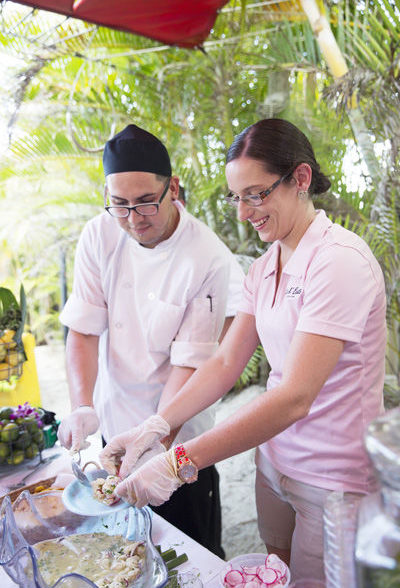
Sometime around 1985, lionfish joined the ranks of thousands of other non-native fish, wildlife and plant species that are negatively impacting Florida’s ecosystems. And, like the aggressive pythons released into the Everglades, the invasive lionfish are yet another cautionary tale demonstrating how human carelessness can wreak havoc on the environment.
Two years ago the Florida Fish and Wildlife Conservation Commission (FWC) established the first Saturday after Mother’s Day as annual Lionfish Removal and Awareness Day, encouraging events around the state to heighten awareness of the problem. One of those took place this past Saturday at Capt. Hiram’s – the inaugural Sebastian Lionfish Fest: Making Delicious Dishes from Destructive Fishes, which also featured a lionfish diving tournament. The event was put together by Kendra Cope, sea turtle coordinator and environmental specialist for Indian River County Public Works, along with volunteers from numerous governmental and environmental organizations.
Lionfish, which have no significant natural predators, are rapidly expanding their range while decimating the native fish population along the way. Humans are about the only way to control their spread, so to assist with their eradication there are no fishing licenses required or seasonal/size/number limits and they really do taste pretty good.
Six local restaurants participated in the event, each preparing the fish in a variety of styles and offering up generous servings to roughly 250 hungry diners. The Wave at Costa d’Este and The Old Fish House served two tasty versions of ceviche. Citrus Grillhouse highlighted the delicate taste of the white, flaky fish, searing and serving it over lemony pasta. Carb lovers and dieters were equally satisfied, enjoying Mulligan’s fried lionfish sliders or Kountry Kitchen’s simple fish skewers with bacon and tomato on a lettuce leaf. Host restaurant Capt. Hiram’s served up delightful lionfish and seaweed salad nachos.
“My favorite was Citrus Grillhouse, but I have to say, I liked it all. I’m glad I came up to do this,” said Grant Withers, an Environmental Learning Center volunteer.
The ELC was one of a number of organizations – including FAU Harbor Branch Oceanographic Institute, the Vero Beach FIT Marine Lab, Keep Indian River Beautiful and the Indian River Lagoon Aquatic Preserves – which partnered for the event.
In addition to demonstrating safe filleting techniques (using caution to avoid the venomous spines along dorsal, pelvic and anal fins), researchers from the Marine Lab were setting aside inedible bits and pieces such as guts and eyes for later analysis.
“This is a lesson to all of us that we shouldn’t release our pets into the wild because of the potential consequences,” said FWC’s Jeff Beal. “It’s most important to not release destructive species. We encourage people to turn the animals in responsibly, and we have pet amnesty days where people can bring us pets they no longer want.”



